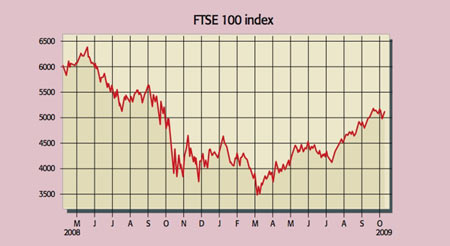Get the latest financial news, insights and expert analysis from our award-winning MoneyWeek team, to help you understand what really matters when it comes to your finances.
You are now subscribed
Your newsletter sign-up was successful
Want to add more newsletters?

Twice daily
MoneyWeek
Get the latest financial news, insights and expert analysis from our award-winning MoneyWeek team, to help you understand what really matters when it comes to your finances.

Four times a week
Look After My Bills
Sign up to our free money-saving newsletter, filled with the latest news and expert advice to help you find the best tips and deals for managing your bills. Start saving today!
"There's a very big risk" that markets are being "irrationally exuberant", as Nobel Prize-winning economist Joseph Stiglitz put it this week. The overall tone remains bullish, with the FTSE 100 notching up a gain of 21% between June and September, the best quarterly performance since its inception in 1984. And most markets made a solid start to this week too.
Yet there has "unquestionably been a rise in wobbly data again recently", says Lex in the FT. The jump in the monthly US jobless figures after months of falls, along with another slide in hourly earnings growth, poured a "big bucket of cold water" over "the idea that the economy was on a self-sustaining and uninterrupted path to recovery", says Miller Tabak's Dan Greenhaus.
Things don't look particularly good on this side of the Atlantic either. While the services sector is rebounding, August's sharp drop in industrial production now at its lowest level since 1987 is a stark reminder of how fragile the recovery is.
MoneyWeek
Subscribe to MoneyWeek today and get your first six magazine issues absolutely FREE

Sign up to Money Morning
Don't miss the latest investment and personal finances news, market analysis, plus money-saving tips with our free twice-daily newsletter
Don't miss the latest investment and personal finances news, market analysis, plus money-saving tips with our free twice-daily newsletter

Another worry is that markets are far from cheap. The S&P 500 is now on a cyclically adjusted p/e (this takes the average earnings over the past ten years to smooth out the effects of the cycle on company profits) of 19. The global market is on 14 times expected 2010 earnings. Indeed, when this rally began, stocks weren't even all that cheap: John Authers in the FT points out that at the bottom of major bear markets the cyclical p/e measure falls as low as six, a level not seen on any stockmarket in March.
It was the same story in March 2003, when the four-year bear market rally followed the post-2000 decline. Then, too, cheap money (Alan Greenspan had slashed rates to 1%) boosted prices "before all speculative excess had been cleaned out of the system".
This mirrors the way the economic downturn was constantly put off, with the housing bubble replacing the tech bubble and now a government debt bubble replacing the housing bubble. But we can't put off the pain forever: there are no more bubbles to blow up. While the liquidity spree could keep stocks fizzing for now, as we noted last week, the medium-term outlook is bleak as the bear has unfinished business.
Get the latest financial news, insights and expert analysis from our award-winning MoneyWeek team, to help you understand what really matters when it comes to your finances.
MoneyWeek is written by a team of experienced and award-winning journalists, plus expert columnists. As well as daily digital news and features, MoneyWeek also publishes a weekly magazine, covering investing and personal finance. From share tips, pensions, gold to practical investment tips - we provide a round-up to help you make money and keep it.
-
 Last chance to invest in VCTs? Here's what you need to know
Last chance to invest in VCTs? Here's what you need to knowInvestors have pumped millions more into Venture Capital Trusts (VCTS) so far this tax year, but time is running out to take advantage of tax perks from them.
-
 ISA quiz: How much do you know about the tax wrapper?
ISA quiz: How much do you know about the tax wrapper?Quiz One of the most efficient ways to keep your savings or investments free from tax is by putting them in an Individual Savings Account (ISA). How much do you know about ISAs?

